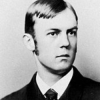Charles Horton Cooley

Charles Horton Cooley
Charles Horton Cooleywas an American sociologist and the son of Thomas M. Cooley. He studied and went on to teach economics and sociology at the University of Michigan, and he was a founding member and the eighth president of the American Sociological Association. He is perhaps best known for his concept of the looking glass self, which is the concept that a person's self grows out of society's interpersonal interactions and the perceptions of others...
NationalityAmerican
ProfessionSociologist
CountryUnited States of America
book men curiosity
In most cases a favorite writer is more with us in his book than he ever could have been in the flesh; since, being a writer, he is one who has studied and perfected this particular mode of personal incarnation, very likely to the detriment of any other. I should like as a matter of curiosity to see and hear for a moment the men whose works I admire; but I should hardly expect to find further intercourse particularly profitable.
blow men self
One of the great reasons for the popularity of strikes is that they give the suppressed self a sense of power. For once the human tool knows itself a man, able to stand up and speak a word or strike a blow.
men individuality bread
Each man must have his I; it is more necessary to him than bread; and if he does not find scope for it within the existing institutions he will be likely to make trouble.
running pride men
If the man succeeds in becoming indifferent to the opinions of his neighbors he runs into another danger, that of a distorted and extravagant self of the pride sort, since by the very process of gaining independence and immunity from the stings of depreciation and misunderstanding, he has perhaps lost that wholesome deference to some social tribunal that a man cannot dispense with and remain quite sane.
character hypocrite men
If we divine a discrepancy between a man's words and his character, the whole impression of him becomes broken and painful; he revolts the imagination by his lack of unity, and even the good in him is hardly accepted.
mean men should-have
Prudence and compromise are necessary means, but every man should have an impudent end which he will not compromise.
eye men presence-of-mind
We are ashamed to seem evasive in the presence of a straightforward man, cowardly in the presence of a brave one, gross in the eyes of a refined one, and so on. We always imagine, and in imagining share, the judgments of the other mind.
men views iron
It is surely a matter of common observation that a man who knows no one thing intimately has no views worth hearing on things in general. The farmer philosophizes in terms of crops, soils, markets, and implements, the mechanic generalizes his experiences of wood and iron, the seaman reaches similar conclusions by his own special road; and if the scholar keeps pace with these it must be by an equally virile productivity.
men order grace
A man may lack everything but tact and conviction and still be a forcible speaker; but without these nothing will avail... Fluency, grace, logical order, and the like, are merely the decorative surface of oratory.
men artist desire
To desire to be an artist is to desire to be a complete man in respect to some one function, to realize yourself utterly. A man is a poor thing who is content not to be an artist.
men individuality bread
Each man must have his I; it is more necessary to him than bread.
freedom men soul
No matter what a man does, he is not fully sane or human unless there is a spirit of freedom in him, a soul unconfined by purpose and larger than the practicable world.
american-sociologist effective fact general human organized social
The general fact is that the most effective way of utilizing human energy is through an organized rivalry, which by specialization and social control is, at the same time, organized co-operation.
children home evil
Simplicity is a pleasant thing in children, or at any age, but it is not necessarily admirable, nor is affectation altogether a thing of evil. To be normal, to be at home in the world, with a prospect of power, usefulness, or success, the person must have that imaginative insight into other minds that underlies tact and savoir-faire, morality and beneficence. This insight involves sophistication, some understanding and sharing of the clandestine impulses of human nature. A simplicity that is merely the lack of this insight indicates a sort of defect.